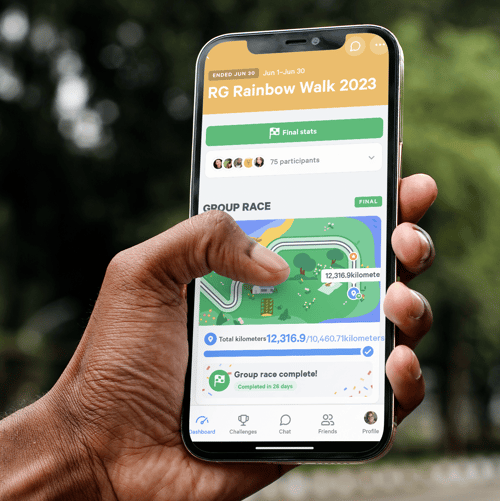Supporting employee wellbeing is a top priority for a lot of organizations right now, especially those with hybrid and remote workforces. Brainstorming creative and engaging ways to prioritize your employees can sometimes be a challenge, but never impossible.
Here at Reward Gateway, we believe that wellbeing should be at the heart of everything you do – that’s why our internal employee wellbeing program is called HEART: Healthy Everyday Actions Reached Together. And given that April is Stress Awareness Month – followed by Mental Health Awareness Month in May – now is a great time to check in on your remote employees’ wellbeing. There are dozens of ways to do this at your own organization, depending on your unique workforce and their particular needs, but here are five easy ways to improve wellbeing for remote employees in 2024.
| 5 easy ways to improve employee wellbeing in your organization |
| 1. Step challenges |
| 2. Virtual social hours |
| 3. Lunch & Learns |
| 4. Meeting-free scheduling blocks |
| 5. Wellbeing theme periods |
1. Step challenges (and more!)
 A great way to stay connected with your dispersed workforce is through company-wide challenges and activities. Our wellbeing app, MoveSpring, allows you to gamify employee wellbeing practices through challenges and curated content. Track your steps throughout the day, how many glasses of water you drink or how many hours of sleep you get each night. You can even use challenges to encourage peer-to-peer recognition!
A great way to stay connected with your dispersed workforce is through company-wide challenges and activities. Our wellbeing app, MoveSpring, allows you to gamify employee wellbeing practices through challenges and curated content. Track your steps throughout the day, how many glasses of water you drink or how many hours of sleep you get each night. You can even use challenges to encourage peer-to-peer recognition!
2. Virtual social hours
After-work social hours can still be possible, even when colleagues are across the country. Reward Gateway has traveled this avenue with pumpkin carving competitions at Halloween, various themed trivia nights throughout the year and card decorating activities for occasions like Valentine’s Day. Encouraging team members to bring kids, pets, loved ones or a fun beverage of their choice can make the time more engaging and allow you to get to know your peers on a more personal level.
3. Lunch & learns
Incorporating food into training can be a great way to boost engagement: Send out delivery app gift cards for remote employees to participate in catered events from afar to ensure everyone can feel included. Setting aside an hour of time where everyone can enjoy a meal together and learn something new builds a sense of community. We strongly recommend making your lunch-and-learn sessions “extra curricular” – in other words, they should be learning sessions, not working sessions. DEI topics, wellbeing seminars and industry networking opportunities are all great options for L&L events.
Don’t overwrite your employees’ lunch hour with company meetings or role-required trainings, as those should occur during normal business hours.
4. Meeting-free schedule blocks
 We’re all busy. We have back-to-back meetings and continuous projects to work on – and research shows that more than 80% of employees spend a third of their work-week tied up in meetings, coming to a full 15% of overall organizational time spend.
We’re all busy. We have back-to-back meetings and continuous projects to work on – and research shows that more than 80% of employees spend a third of their work-week tied up in meetings, coming to a full 15% of overall organizational time spend.
Creating meeting-free schedule blocks gives employees a solid stretch of time to focus on to-do lists and GSD (“get stuff done”). For your more introverted employees, meeting-free time is also vital recharge time that they need to show up better for their teams and tasks.
Additionally, it’s medically recommended to take a break from your screen every 20 minutes for eye health. While we know that’s not always feasible – especially on those meeting-heavy days – giving yourself and your employees the grace to take a 1:1 meeting from their phone on their daily walk or a period of time blocked off on the calendar for meeting-free work time can make a substantial difference in their wellbeing.
5. Wellbeing theme periods
The calendar year offers up dozens of observances that cover the full spectrum of wellbeing. For example, April is Stress Awareness Month, May is both Mental Health Awareness Month and Healthy Vision Month, July is UV Safety Month and September is National Food Safety Education Month. Not all of these observances will be relevant to your organization or employees – for example, non-healthcare organizations are less likely to celebrate National Nurses Week, but National Heart Health Month might be worth mention for organizations that require physical labor from employees.
At Reward Gateway we believe in treating our employees like whole people, with wellbeing being at the forefront of everything we do. We encourage you to see what corporate wellness strategy works best for you and your team!

 Klara Owens
Klara Owens

